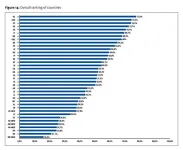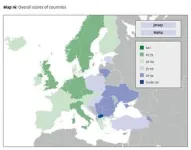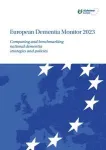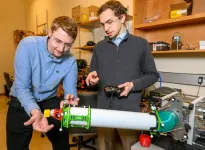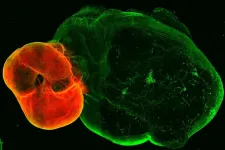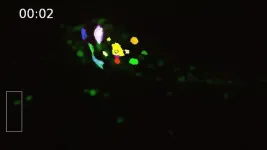(Press-News.org) Brussels, 5 December 2023 – In a report launched today at a lunch debate hosted by Deirdre Clune MEP (Ireland), Alzheimer Europe highlighted the continuing inequalities in access to dementia care and treatment across Europe.
The objective of the report entitled “European Dementia Monitor” was to provide a benchmark of national dementia policies in order to compare and rate the responses of European countries to the dementia challenge. The survey covered all Member States of the European Union (with the exception of Latvia), as well as Armenia, Iceland, Israel, Jersey, North Macedonia, Norway, Serbia, Switzerland, Turkey, United Kingdom (both England and Scotland) and Ukraine.
Jean Georges, Executive Director of Alzheimer Europe, stated:
“Our organisation has consistently called upon European governments to recognise dementia as a national public health and research priority, and to develop national dementia strategies. The aim of the European Dementia Monitor is to assess which countries provide the most dementia-inclusive policies and guarantee the best support and treatment of people with dementia and their carers. This third edition of our report shows continuing inequalities between European countries, and we hope that national governments will use this report to improve the lives of people with dementia and their carers in those areas where they are currently lagging behind.”
The European Dementia Monitor compares countries on 10 different categories:
1. The availability of care services
2. The affordability of care services
3. The reimbursement of medicines and other medical interventions
4. The availability of clinical trials
5. The involvement of the country in European dementia research initiatives
6. The recognition of dementia as a policy and research priority
7. The development of dementia-friendly initiatives
8. The recognition of legal rights
9. The ratification of International and European human rights treaties
10. Care and employment rights
According to the findings of the European Dementia Monitor, no country excelled in all 10 categories and there were significant differences between European countries. Some of the key findings were:
• Luxembourg scored highest on care availability with most services rated as sufficiently available, whereas Norway scored highest on care affordability as it ensured that these services were accessible and affordable for people with dementia and their carers. On both care availability and care affordability, Bulgaria ranked last.
• On the availability and reimbursement of medical interventions, Sweden scored highest as all included medical interventions (with the exception of Fortasyn Connect) were covered by the national reimbursement system. Armenia ranked last in this category as none of the medical interventions were reimbursed.
• As Europe is waiting for the authorisation by the European Medicines Agency of new anti-amyloid treatments for Alzheimer’s disease, only Greece, Ireland, Slovakia, Sweden and the United Kingdom (England) had set up a working group or strategy to prepare for the introduction of these new treatments.
• France scored highest in the category of clinical trials as the only country where it was possible for people with dementia to take part in eight of the 10 phase III clinical trials which were studied for the report. The Netherlands, Spain and the United Kingdom came second, with seven clinical trials active in these countries. Armenia, Lithuania, Luxembourg, Malta and North Macedonia were on the other end of the scale, with no clinical trials available for people with dementia in those countries.
• France, Germany and the Netherlands were the countries that were the most active in European dementia research collaborations scoring 100% in that category, whereas Armenia, Cyprus, Greece, Iceland, Lithuania, Malta, North Macedonia, Serbia and Ukraine were not involved in the Joint Programme for Neurodegenerative Diseases Research (JPND) or any of the calls for European research collaboration.
• For recognition of dementia as a national policy and research priority, the United Kingdom (Scotland) came first with full marks whereas North Macedonia, Serbia and Ukraine did not score any points in this category.
• The United Kingdom (England and Scotland) had the most dementia-inclusive initiatives and communities, but Luxembourg, North Macedonia, Portugal and Serbia did not score any points in this category.
• Regarding the protection of the legal rights of people with dementia, a growing number of countries complied with Alzheimer Europe’s five recommendations in this field (Austria, Croatia, Czech Republic, Denmark, France, Germany, Iceland, Ireland, Israel, Italy, Jersey, Netherlands, Norway, Portugal, Slovenia, Spain, Sweden and the United Kingdom (England)). However, Bulgaria, North Macedonia, Poland and Romania scored no points in this category.
• In relation to International and European Human Rights Conventions, there has been progress since earlier editions of the Monitor (2017 and 2020), with an increasing number of countries (Cyprus, Czech Republic, Estonia, Finland, France, Greece and Portugal) having signed and ratified all of the treaties. Israel was the country with the least number of conventions signed and ratified.
• The Czech Republic, the Netherlands and the United Kingdom (Scotland) were the three countries where all care and employment rights were recognised, whereas Armenia, Cyprus and Ukraine came last in this category with none of these rights recognised in legislation.
Deirdre Clune MEP (Ireland) welcomed the findings of the European Dementia Monitor:
“As a Member of the European Parliament and as Vice-Chairperson of the European Alzheimer’s Alliance, I am interested in how European countries differ in their approaches to dementia care and treatment, and I hope that reports like this one can help identify good practices to be implemented in countries lagging behind. As an Irish MEP, I was happy to see that Ireland excelled in some key areas with the development of our national dementia strategy, the Irish Dementia Working Group and the recognition of legal rights. However, my country has some catching up to do in other areas, and more efforts need to be made to provide more accessible and affordable care services. Similarly, I would hope that more clinical trials will be conducted in Ireland to allow people with dementia to participate in research for the development of new and better treatments.”
On the basis of the findings in the 10 identified categories, Alzheimer Europe established a ranking of countries (with each category contributing 10% to the overall score), with the Netherlands coming first with an overall score of 77.6%, followed by the United Kingdom (Scotland) (74.5%), the Czech Republic (74.2%), Germany (72.7%) and Sweden (70.7%). Compared to the 2020 edition of the Dementia Monitor, the Netherlands and the Czech Republic improved their scores and ranking the most, moving up from seventh to first and from 19th place to third place respectively. The United Kingdom (Scotland) and Germany also slightly improved their scores, but Scotland stayed in second place while Germany moved from fifth to fourth place. Sweden moved down from first to fifth place in this year’s ranking, whereas the United Kingdom (England) and Belgium dropped out of the top five and moved to eighth and ninth place respectively.
Gerjoke Wilmink, CEO of Alzheimer Nederland, welcomed the findings:
“I was delighted to see that the Netherlands came first in this extensive survey of Alzheimer Europe. There has been a very strong commitment in my country to finding practical solutions and concrete support for the many people living with Alzheimer’s disease and other types of dementia. We are happy to continue sharing our experiences and good practices with our partner organisations within Alzheimer Europe, and look forward to learning from those countries in categories where the Netherlands did less well.”
Jean Georges, Executive Director of Alzheimer Europe, concluded:
“It was great to see that a number of countries were able to improve the situation of people with dementia and their carers. However, as in our previous editions, we can see that progress is not the same across all European regions. Our Monitor shows that there is still a clear East/West divide in Europe with most of the Western and Northern European countries scoring significantly higher than Eastern European countries. As a rule, countries with national dementia strategies scored better. It is time therefore that all European countries and in particular those in Eastern Europe recognise dementia as a national priority and develop national dementia strategies.”
The full report “European Dementia Monitor 2023: Comparing and benchmarking national dementia strategies and policies” can be downloaded for free: https://www.alzheimer-europe.org/resources/publications/european-dementia-monitor-comparing-and-benchmarking-national-dementia
Notes to editors:
Alzheimer Europe is the umbrella organisation of national Alzheimer associations and currently has 42 member organisations in 37 European countries. Our mission is to change perceptions, policy and practice in order to improve the lives of people affected by dementia.
END
New Alzheimer Europe publication highlights continuing inequalities in access to dementia care and treatment across Europe
2023-12-05
ELSE PRESS RELEASES FROM THIS DATE:
Both virtual and in-person nutrition visits help to lower cholesterol, study finds
2023-12-05
Despite an end to the national public health emergency in May 2023, the use of telehealth remains high, with over 20% of American adults taking appointments online.
These visits include video calls with registered dietitian nutritionists, who have a critical role in helping patients take on lifestyle changes through medical nutrition therapy.
With a focus on the changing digital landscape, researchers at Michigan Medicine found that telemedicine patients with hyperlipidemia — an excess of cholesterol or fats in the blood ...
USC Norris Cancer Hospital earns Leapfrog Top Teaching Hospital award for third year in a row
2023-12-05
LOS ANGELES — The Leapfrog Group, a national hospital watchdog organization, has named USC Norris Cancer Hospital a 2023 Top Teaching Hospital. This is the third year in a row the hospital has received this distinction.
“I am incredibly proud that once again, USC Norris Cancer Hospital ranked among the top hospitals in the country,” said Marty Sargeant, MBA, CEO of USC Norris Cancer Hospital and Keck Hospital of USC. “This prestigious honor reflects our rigorous safety and quality standards and our continuous commitment to our ...
Exposure to soft robots decreases human fears about working with them
2023-12-05
VANCOUVER, Wash. – Seeing robots made with soft, flexible parts in action appears to lower people’s anxiety about working with them or even being replaced by them.
A Washington State University study found that watching videos of a soft robot working with a person at picking and placing tasks lowered the viewers’ safety concerns and feelings of job insecurity. This was true even when the soft robot was shown working in close proximity to the person. This finding shows soft robots hold ...
Study proposes new explanation for California anchovy booms and busts
2023-12-05
New research from Scripps and NOAA scientists has discovered ecological correlations that could help explain the booms and busts of California’s anchovy population. If the correlations hold up to further research, they could one day help inform management of California’s anchovy fishery and improve conservation.
The Northern Anchovy (Engraulis mordax) is a crucial food source for much of California’s most conspicuous marine life – including droves of sea lions, pods of dolphins, lucrative tuna fisheries, and throngs of whales. But one of the hallmarks of the anchovy population off California ...
A new publication in Nature Communications can revolutionize the treatment of Parkinson's patients
2023-12-05
The results are just published in Nature Communications under the title "Enhanced production of mesencephalic dopaminergic neurons from lineage-restricted human undifferentiated stem cells."
In the new research findings, DANDRITE group leader and Associate Professor Mark Denham has developed a method that ensures much higher purity of the so-called dopamine cells, which are crucial in connection with Parkinson's disease.
"Stem cells offer promising potential for treating Parkinson's disease by transforming into specific nerve cells. However, the precision of this transformation poses a significant challenge with current methods, resulting in low purity," ...
Eye scans provide crucial insights into kidney health, study finds
2023-12-05
3D eye scans can reveal vital clues about kidney health that could help to track the progression of disease, research suggests.
The advance could revolutionise monitoring of kidney disease, which often progresses without symptoms in the early stages.
Experts say the technology has potential to support early diagnosis as current screening tests cannot detect the condition until half of the kidney function has been lost.
Researchers used highly-magnified images to detect changes to the retina – the layer of tissue at the back of the eye that senses light and sends signals to the ...
Diamonds and rust help unveil ‘impossible’ quasi-particles
2023-12-05
Researchers have discovered magnetic monopoles – isolated magnetic charges – in a material closely related to rust, a result that could be used to power greener and faster computing technologies.
Researchers led by the University of Cambridge used a technique known as diamond quantum sensing to observe swirling textures and faint magnetic signals on the surface of hematite, a type of iron oxide.
The researchers observed that magnetic monopoles in hematite emerge through the collective behaviour of many spins (the angular momentum of a particle). These monopoles glide across the swirling textures on the surface of the hematite, like tiny ...
Unlocking the secrets of the brain’s dopaminergic system
2023-12-05
A new organoid model of the dopaminergic system sheds lights on its intricate functionality and potential implications for Parkinson’s disease. The model, developed by the group of Jürgen Knoblich at the Institute of Molecular Biotechnology (IMBA) of the Austrian Academy of Sciences, replicates the dopaminergic system’s structure, connectivity, and functionality. The study, published on December 5 in Nature Methods, also uncovers the enduring effects of chronic cocaine exposure on the dopaminergic circuit, even after withdrawal.
A completed run, the early morning hit of caffeine, the smell of cookies in the oven - these ...
Enhanced AI tracks neurons in moving animals
2023-12-05
Recent advances allow imaging of neurons inside freely moving animals. However, to decode circuit activity, these imaged neurons must be computationally identified and tracked. This becomes particularly challenging when the brain itself moves and deforms inside an organism’s flexible body, e.g. in a worm. Until now, the scientific community has lacked the tools to address the problem.
Now, a team of scientists from EPFL and Harvard have developed a pioneering AI method to track neurons inside moving and deforming animals. The study, now published ...
UC San Diego Health recognized as leader in high quality OB/GYN care
2023-12-05
UC San Diego Health is recognized as a 2023-2024 High Performing Hospital for Maternity Care, which is the highest award a hospital can earn by U.S. News & World Report for obstetric and infant care.
To be recognized as High Performing in Maternity Care, hospitals must meet high standards in caring for patients with uncomplicated pregnancies, such as low cesarean section rates, low newborn complication rates, offering transparency on racial and ethnic disparities, and other measures.
“It is an honor to receive this prominent recognition, ...
